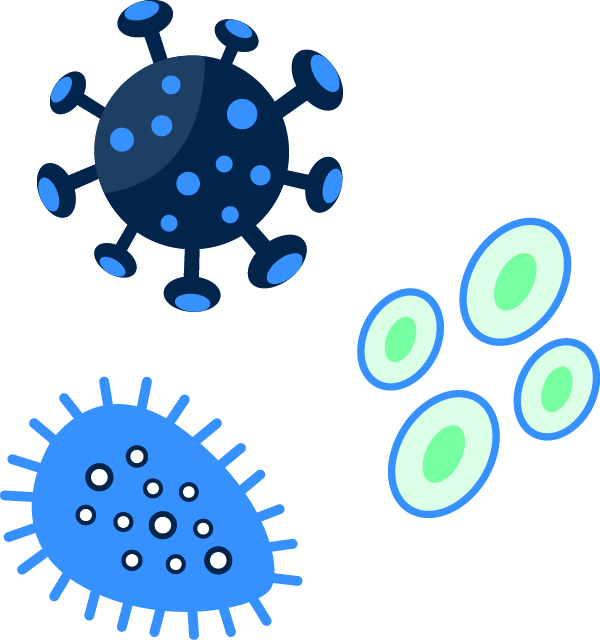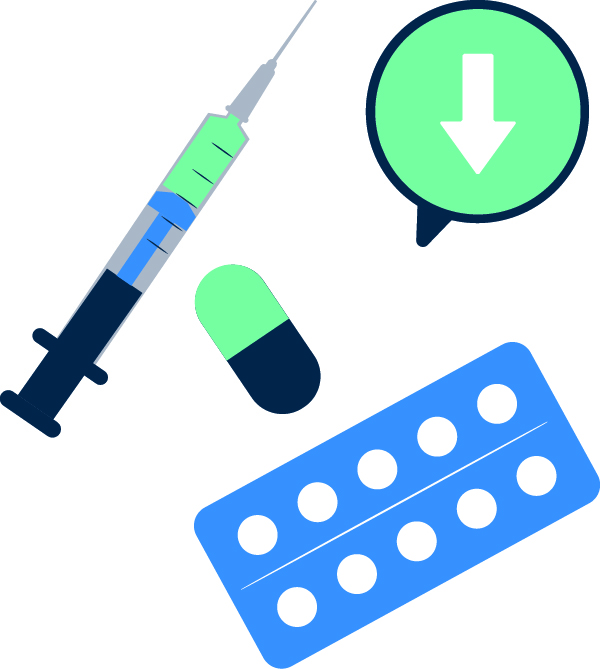That is the reason why, in line with ongoing initiatives on antibiotics, a national ‘One World, One Health’ action plan was launched to combat AMR. Indeed, an intersectoral and multidisciplinary approach remains necessary to ensure the rational use of antimicrobials. The AMR National Action Plan focuses on judiciously reducing and improving the use of antimicrobials (and antibiotics in particular), in order to prevent the development and spread of resistant microbes in humans, animals, plants and the environment. In hospitals, antimicrobial resistance is being fought by means of programmes such as Infection Prevention and Control (IPC) and Antimicrobial Stewardship (AMS), with the aim of maximising the prevention of infection transmission and supporting and encouraging the judicious use of antibiotics.
Learn more about the National Action Plan?: https://www.health.belgium.be/en/belgian-one-health-national-action-plan-fight-against-antimicrobial-resistance-2020-2024
Evolution of the consumption of antibacterial agents for systemic use expressed as the number of DDD per 1,000 bed-days
Evolution of the consumption of antibacterial agents for systemic use expressed as the number of DDD per 1,000 stays
The decreasing trend can possibly be explained by a change in the epidemiological situation in which more admissions (and therefore a larger denominator), lead to a decrease when antibiotic use is expressed as DDD per 1,000 admissions. On the other hand, a shorter length of stay (with fewer bed days and therefore a smaller denominator) may contribute towards an upward trend when antibiotic use is expressed as DDD per 1,000 bed days. Although current figures provide a good estimate of antibiotic use in Belgian hospitals, more detailed research is needed.
ESAC-Net’s online platform also allows antibiotic use to be compared with that of surrounding countries[4]. At 1.4 DDD per 1,000 inhabitants per day, (DID), Belgium scored lower than the European average of 1.5 DID and was below France at 1.7 DID in 2021. From 2012 to 2021, Belgian hospitals reduced the absolute use of antimicrobials by 17%, the largest decrease having taken place between 2019 and 2020. Despite this decrease, the prescription pattern in Belgian hospitals remains higher than in Dutch hospitals (0.7 DID in 2021).
The use of broad-spectrum antibiotics in Belgium accounted for 31% of total antibiotic use in the hospital sector in 2021. However, this percentage varies widely between different hospitals. It is important to maintain the commitment to prescribe antibiotics responsibly, based on guidelines and diagnostic results. This will ensure that broad-spectrum antibiotics are used carefully for complex cases. The role of the infectiologist is crucial in this regard.
Learn more? Read the BELMAP report! https://www.health.belgium.be/en/belmap-2022
Infection prevention
Compliance with hand hygiene by healthcare providers is considered the most important factor in preventing the transmission of healthcare-associated infections among patients. Since 2005, hand hygiene campaigns have been organised in Belgian hospitals by the FPS Public Health, in collaboration with Sciensano, to raise awareness of good practices among staff, patients and visitors and to promote hand disinfection.
In the period from 2005 up to and including 2019, we can consistently see a clear effect of the campaign to promote hand hygiene compliance. What is more, we can also observe an upward trend over time.
In 2021, the 9th campaign on hand hygiene was launched. That campaign did not involve a pre-campaign measurement. After the campaign, we can see that in 80.4% of measured situations, the rules concerning hand hygiene were followed.
Evolution in following the guidelines on hand hygiene (%)

The ninth campaign focused on improving compliance for the following indications:
- Hand hygiene in venous/arterial contact (79.3% after the campaign in 2021 vs. 80% in 2019)
- Hand hygiene for urinary tract contact (82.7% after the campaign in 2021 vs. 87.9% in 2019)
As with previous campaigns, nurses achieved the best post-campaign results (87%) compared to other healthcare providers.
Want to know more about the results?https://www.health.belgium.be/sites/default/files/sciensano_resultats_9e_campagne_nationale_hdm_2020-2021_version1.0.pdf
Would you like to know more? https://www.health.belgium.be/fr/sante/prenez-soin-de-vous/influences-de-lenvironnement/hygiene-des-mains
Would you like to know more? www.noso-info.be
Hospital Outbreak Support Teams (HOST)
The FPS Public Health, Food Chain Safety and Environment has launched Hospital Outbreak Support Teams (HOST) as pilot projects to strengthen Infection Prevention and Control (IPC) and Antimicrobial Stewardship (AMS) teams in hospitals. With these teams, the FPS also aims to increase the availability of IPC and AMS expertise for nursing homes and primary care providers.
The HOST pilot projects operate by means of two complementary axes:
- a local-regional approach focusing on resource sharing and cooperation among hospitals within a locoregional network;
- a cross-cutting approach with knowledge transfer between all partners involved.
Number of HOST projects by region
‘24 HOST pilot projects were launched in 2021 and 2022 in Belgium’
24 HOST pilot projects were launched in 2021 and 2022, of which 4 in the Brussels-Capital Region, 12 in the Flemish Region and 8 in the Walloon Region, based on a submitted and approved project proposal. Regional hospital networks designated a coordinating hospital that signed an agreement with the FPS Public Health, Food Chain Safety and Environment.
The hospital networks have established HOST teams consisting of people with expertise in infectious diseases, medical microbiology, clinical pharmacy and infection prevention and control.
The activities of 2022 and beyond will be analysed based on narrative progress reports on the following topics:
- Preparation of local IPC/AMS guidelines, tools and procedures;
- Education and training;
- Surveillance, monitoring and feedback;
- Implementing multimodal strategies to improve IPC and AMS.
Special attention was given to surveillance, with a budget of €120,000 per network allocated in 2022 to improve comprehensive epidemiological surveillance, analysis and feedback of data on antimicrobial use and healthcare-associated infections in participating hospital networks.
The integration of the HOST teams into the existing IPC and AMS structures is accompanied by challenges but is systematically improving thanks to the involvement of key actors in the hospitals, discussions in regional and national platforms and efforts to improve the interoperability of the IPC, AMS and AMR databases within the network.
A key concept of the HOST projects is the cross-fertilisation of experiences and lessons learned from the various HOST projects. In this regard, an intervision day was organised in October 2022. On the occasion of this event, several ongoing projects of the HOST teams were presented and successes, failures and lessons learned were shared among the teams. The step-by-step approach enables teams to grow and progress in the complex landscape and diverse realities of IPC and AMS in our healthcare system. Similar intervision days will also be organised in 2023 and 2024.

Learn more? https://organesdeconcertation.sante.belgique.be/fr/projet-pilote-hospital-outbreak-support-teams-host
[1] https://www.ecdc.europa.eu/en/about-us/networks/disease-networks-and-laboratory-networks/ears-net-data
[2] Bron: https://www.healthstat.be/#/main
[3] Selection of antibacterial agents for systemic use was performed on the basis of ATC code J01. Only consumption in Belgian acute hospitals excluding psychiatric services and day hospitalisations was taken into account.
[4] https://www.ecdc.europa.eu/en/antimicrobial-consumption/surveillance-and-disease-data/database


